#Joseph Bonaparte
Text


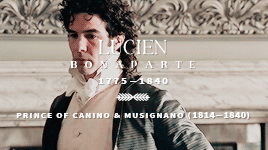
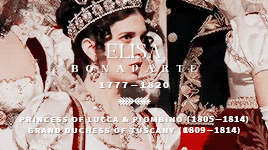

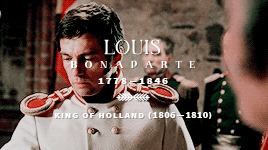


the bonaparte siblings (requested by anon)
"They were not worried about seeming out of place, they did not fear making mistakes or doing something silly; they had no concern for responsibilities; they had a self-confidence that was not even accompanied by a sense of the duties high position entailed. And this self-confidence sustained them despite everything, and so long as their luck held, it made easy for them things that to others seemed simply impossible. […] The audacity to attempt everything, the certainty of succeeding everywhere— in short, all the attributes of genius, except for genius." — Frédéric Masson
J O S E P H's close bond with the Emperor was often tested throughout their political careers, but never broken. He was without question his closest companion but proved to be more successful as a businessman before and after the Empire.
L U C I E N was never offered a crown or a throne, and broke off from the rest of the family as early as the 1800s. He frequently opposed his brothers' views and notably refused to divorce his wife in favor of a diplomatic alliance. Unlike his siblings, his title was bestowed by the Pope.
E L I S A, contrary to her sisters who primarily held consort roles or acted as strawmen, is believed to be the only Bonaparte sister, and only woman, with actual political powers bestowed by the Emperor. She's the only one of the adult siblings to die before him.
L O U I S' frequent conflicts with the Emperor led Napoléon to annex the Kingdom of Holland in 1810, driving him and his family into exile. Louis would go on to become the father of Napoléon III.
Despite a tumultuous relationship, P A U L I N E was considered Napoléon's favorite sister, and proved to be the most loyal of the imperial siblings, liquidating her assets and visiting him in Elba.
Often regarded as the most influential of the Bonaparte sisters, C A R O L I N E was constantly caught in-between her husband and her brother. She was instrumental in the divorce and remarriage of the Emperor. Her political legacy not only didn't survive the fall of the Empire, but effectively predated it through a series of conflicts with her brother.
J E R O M E was the last sibling standing by 1860, and out of them all was the only one to support the Emperor at Waterloo. He would also be the only one to see the re-creation of the Empire and his nephew on the throne.
#perioddramaedit#historyedit#mine#19th century#*#napoléon bonaparte#jérôme bonaparte#elisa bonaparte#pauline bonaparte#louis bonaparte#lucien bonaparte#caroline bonaparte#joseph bonaparte
287 notes
·
View notes
Text
“The women are everywhere—plays, public walks, libraries. You can see pretty women in the scholar’s study room. . . . A woman, in order to know what is due her and what power she has, must live in Paris for six months.”
— Napoleon in a letter to his brother, Joseph
Source: J. Christopher Herold, The Age of Napoleon
#the emperor has spoken ☝️#napoleon#napoleon bonaparte#joseph bonaparte#Joseph#J. Christopher Herold#herold#Paris#napoleonic era#napoleonic#first french empire#french empire#france#women’s history#19th century#history#Napoleon’s correspondence#letter#Napoleon’s quotes#Napoleon and women#women#Napoleon’s brothers#the age of Napoleon
118 notes
·
View notes
Text
Les Invalides -inside the Dome

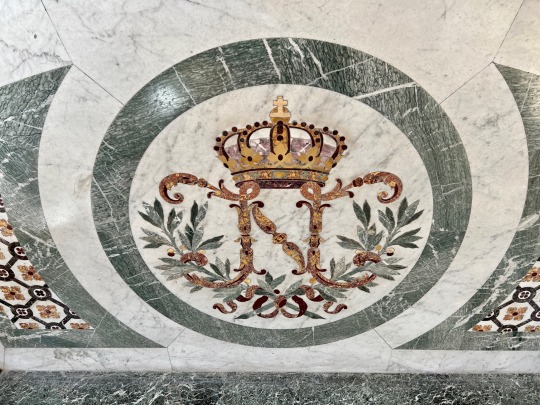

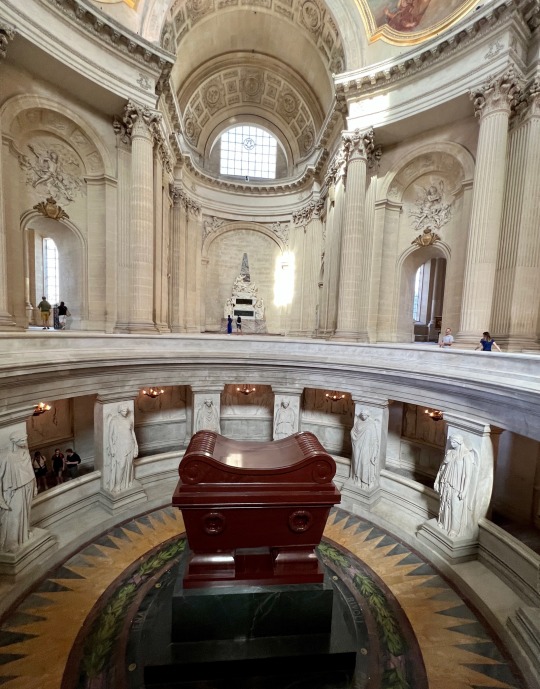




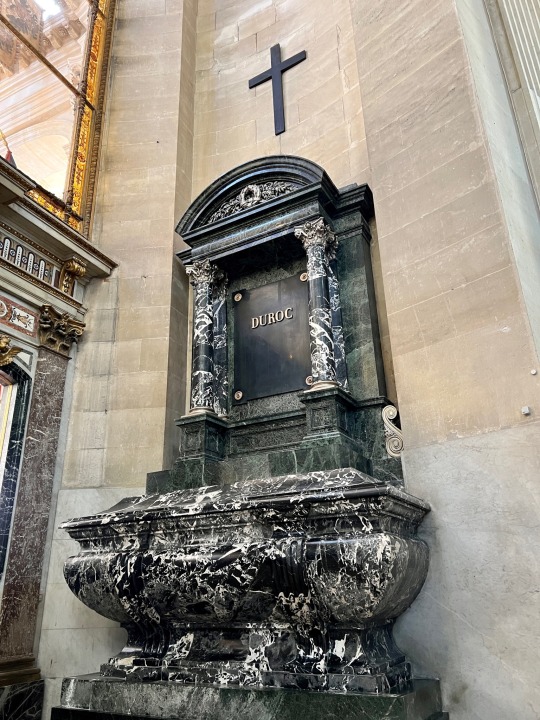
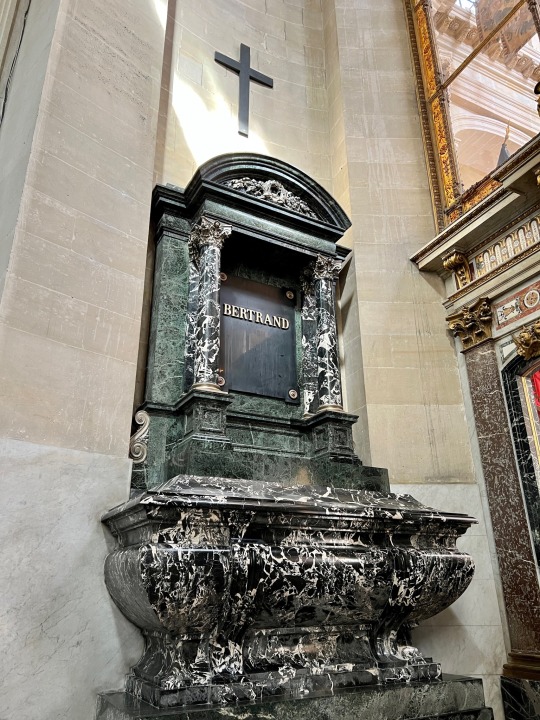
#France trip 2023#Les Invalides#Joseph Bonaparte#Jérôme Bonaparte#Napoleon#Napoleon Bonaparte#France
235 notes
·
View notes
Text

I also forgot just how much I hated (and still hate) Joseph Bonaparte
#napoleonic shitpost#napoleonic era#napoleonic#joseph bonaparte#history shitposting#history memes#fuck you joseph#i hate joseph#fuck you joseph you SUCK
70 notes
·
View notes
Text
EIGHT SURVIVING CHILDREN OF CARLO AND LETIZIA BONAPARTE, SIBLINGS OF NAPOLEON I 🥺🌟♥️

254 years ago on this day, Napoleon Bonaparte, the first French emperor was born
On the occasion of his birthday, meet the Eight surviving children of Carlo and Letizia Bonaparte, who lived to adulthood
Letizia Bonaparte gave birth to 13 children between 1768 and 1784; five of them died, two at birth and three in their infancy...😥🥀
Among the 13 children, the first child who died was Napoleone Buonaparte, who was born on August 17, 1765 and died on the same day... The last child to die was Jérôme Bonaparte, who died 95 years after his eldest brother...
The registered names of all the children of Carlo and Letizia Bonaparte:
• Napoleone Buonaparte (born and died 17 August 1765)
• Maria Anna Buonaparte (3 January 1767 – 1 January 1768)
• Joseph Bonaparte (7 January 1768 – 28 July 1844)
• Napoleon Bonaparte (Later French emperor) (15 August 1769 – 5 May 1821)
• Maria Anna Buonaparte (14 July 1771 – 23 November 1771)
• A stillborn child (1773)
• Lucien Bonaparte (21 March 1775 – 29 June 1840)
• Maria Anna (Elisa) Bonaparte (3 January 1777 – 7 August 1820)
• Louis Bonaparte (2 September 1778 – 25 July 1846)
• Pauline Bonaparte (20 October 1780 – 9 June 1825)
• Caroline Bonaparte (25 March 1782 – 18 May 1839)
• Jérôme Bonaparte (15 November 1784 – 24 June 1860)
#Carlo Buonaparte#Letizia Bonaparte#Joseph Bonaparte#Napoleon Bonaparte#Lucien Bonaparte#Elisa Bonaparte#Louis Bonaparte#Pauline Bonaparte#Caroline Bonaparte#Jérôme Bonaparte
64 notes
·
View notes
Text
"To rule in France one must either be born in grandeur... or else be capable of distinguishing oneself above all others."
- Napoleon Bonaparte, to his brother Joseph
#napoleon i#napoleon#napoleon bonaparte#first french empire#french history#joseph bonaparte#sunglassesnovel#bonaparte family
48 notes
·
View notes
Text
From Vial's biography of Marie-Louise, about the question of setting up a regency while Napoleon was at war:
The Constitution of year XII had specifically excluded the empress from power, and envisaged [...], to entrust the reins of the State to a prince of the imperial family. A first experiment, the short regency of Joseph from September to December 1805, not having impressed anyone's spirits much, Napoleon had again called upon Cambaceres.
(emphasis by me)
Gotta love it when historians casually burn Joseph...
15 notes
·
View notes
Text
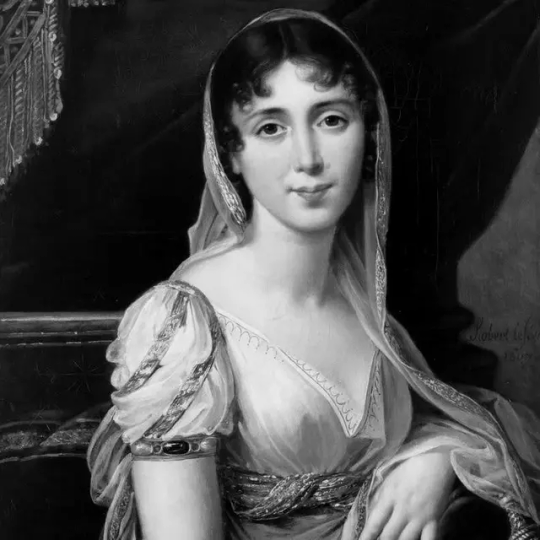

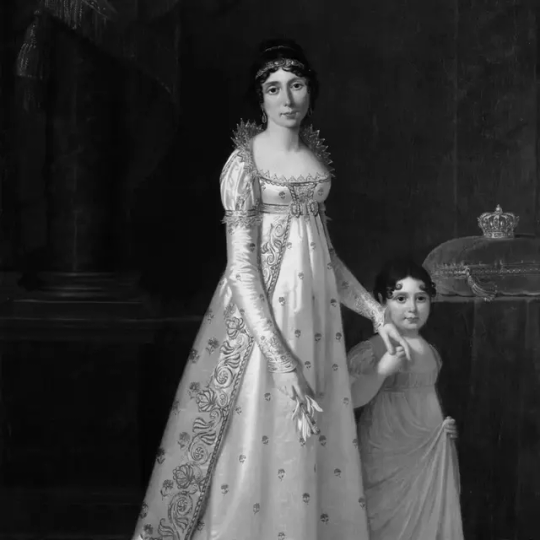
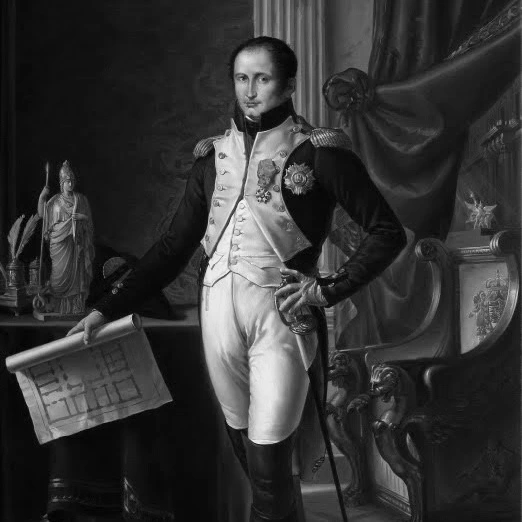
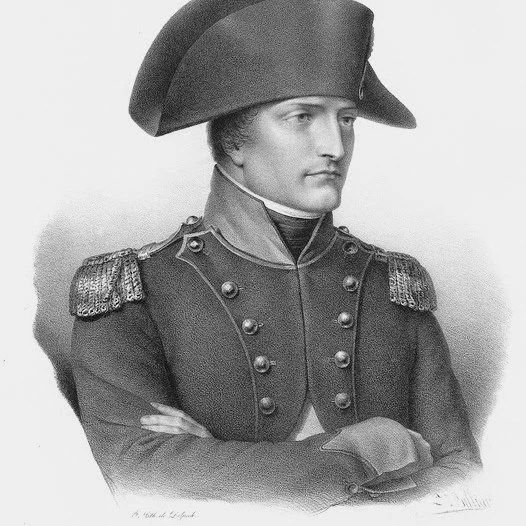
Aug. 17, 1798 - Jean-Baptiste Bernadotte and Désirée Clary got married in Sceaux.
Except for his relationship with Cathérine Lamour, not much is known about Jean-Baptiste’s previous relationship history but in the military his nickname was ‘Belle-Jambe’ (‘beautiful leg’) which is said to have been a hint to “his ability to appeal to the opposite sex”.
When it comes to Désirée we have more knowledge about her history. For example, we know that she had previously been engaged to Joseph Bonaparte. The two got to know each other after he found her sleeping in a waiting room and then walked her home. Through Joseph, Désirée got to know his younger brother Napoleon who took a liking to her and suggested that she should be engaged to him instead, and Joseph to her sister Julie. Something everyone involved thought was a good idea.
Julie Clary and Joseph Bonaparte went on to get married the same year whilst the next year, in 1795, Napoleon ended the engagement with Désirée. In 1797 Désirée moved with her sister and her husband to Rome where Joseph was ambassador. There she became betrothed to Mathurin-Léonard Duphot, a French general. The betrothal was more or less arranged by Napoleon and Désirée herself is said to not have been enthusiastic about the plans. However, two days before the intended wedding, an anti-French riot broke out in Rome and Duphot was killed in the unrest. Later in her life, Désirée vehemently denied that the engagement to Duphot ever happened.
Back in Paris, she got to know the French general Jean-Baptiste Bernadotte. He is said to have given her the nickname “Bonette” and liking arose between the two. They soon became engaged with the wedding taking place later the same year. Since he was a Calvinist and she an atheist, the wedding ceremony was a civil one and not religious.
Photo 1: Portrait of Désirée Clary by Robert Lefèvre, oil on canvas, dated 1807.
Photo 2: Jean-Baptiste Bernadotte in 1797, from the collections of the National Library of Norway.
Photo 3: Portrait of Julie Clary with her daughter Zénaïde Bonaparte by Robert Lefèvre (oil on canvas, 216 cm x 143 cm) dated 1807.
Photo 4: Portrait of Joseph Bonaparte by Jean-Baptiste Wicar (oil on canvas, 230 cm x 176 cm) dated 1808.
Photo 5: Napoleon Bonaparte, Premier Consul. By François Séraphin Delpech and Zéphirin Belliard. Could be dated 1802 but that is an unsure guess.
#swedish royal family#royal history#king karl xiv johan#queen desideria#jean baptise bernadotte#désirée clary#julie clary#joseph bonaparte#napoleon bonaparte#swedish history#on this day#today in history
24 notes
·
View notes
Text
Get Frenchified, idiot

8 notes
·
View notes
Text
MALMAISON MEDIA SALON SOIRÉE 15: NEEDING NAPOLEON (2020)

1. The Introduction
Hello, Neighbors! Welcome back to Malmaison Media Salon! At last we’re here and today is a bit of a special review. Why special?
Let me explain:
1. Firstly, it’s one of those cases where I stumble upon a media piece via recommendation from another community member. This time it was @suburbanbeatnik , who interviewed the author of the book and there was a contest where the first 3 users to comment would get a free ebook copy via email.
I was the first to comment because I was given the link and because I was really excited about what sounded like a promising story, considering my soft spot for the adventure genre, time travel and alternative history. So yeah, I became one of the lucky three users.
Unfortunately, the book is only available in English and has to be purchased through websites like Amazon, so those who don’t speak English too well might be out of luck for now.
2. Secondly, it’s one of the few anglophone (British, to boot!) media pieces that DO NOT paint Napoleon as a villain! How cool is that?! For newcomers, stumbling upon a gem like that is about as likely as seeing a UFO, so you can bet your asses that I HAD to check out the book!
3. Thirdly, I already mentioned that I’m a sucker for adventure, time travel, historical fiction and alternative history so that really boosted my excitement… as well as my worries. I prayed that the book would turn out to be good. Luckily, it did! More on that later though.
Anyway, before we proceed, this review is dedicated to @suburbanbeatnik and @garethwilliamsauthor . Not only is the latter, well, the author, but he also graciously gave me permission to write said review and I’m thankful for this.
Okay, with formalities out of the way, let’s begin!
2. The Summary
The novel tells the story of one Richard Davey, an ordinary schoolteacher who admires Napoleon and lives a very boring, lonely life.
However, during a fateful holiday in Paris, he gets a chance to leave his old life behind, meet his hero and maybe even change the course of history.
To me, the idea sounds very interesting, so let’s move onto the deeper analysis and see if the execution matches the potential.
3. The Story
Although the beginning of the story did confuse me a bit because we jump straight into action, I. Fucking. Love. This. Book. I was extremely hooked when reading and felt like I was back in my childhood, reading my favorite swashbuckling stories. The excitement is REAL.
The pacing is excellent, most loose ends get tied up in the end, the ending is satisfying yet also realistic and we don’t have the protagonist getting everything he wanted, which is awesome!
I did have a problem with the flashbacks though, mainly because they kept popping up and breaking the storyline immersion, but that’s just me.
Also, there’s a good mix of gritty artlessness (in a good way because it doesn’t gloss over war), a swashbuckling adventure, romance and down time (we can’t have action ALL the time).
The romantic subplot is very well-written and realistic, even though my asexual self still didn’t care much because I don’t normally like romance. Spoiler, it’s one of the few times where the protagonist doesn’t get the love interest in the end, for a lot of reasons.
So yeah, only minor complaints here and there.
(Oh, and tiny bonus for the Frev community: Frev isn’t demonized either!!! Yay!!!)
(P. S. Also there were a lot of moments that cracked me up, like the pun with HMS Bellerophon being called Billy Ruffian.)
4. The Characters
Richard Davey is by far one of the most relatable characters ever, since I can relate to his loneliness (me during the worse days of depression) and love for History (I’m a Frev and Napoleonic nerd). He’s flawed, reacts realistically and in his own way to situations and has a great character arc, from a man just going with the motions of life to a hero who can and does make a difference in history, just not in the way he first planned.
Emile Béraud, a soldier Richard befriends in the past, is an absolute sweetheart. Loyal to a fault, friendly and just as lonely as Richard, he takes part in the adventures and is a very compelling character.
Aunt Patricia, Richard’s only living relative, might be a minor character who doesn’t personally appear, but her presence is felt throughout the story and Richard constantly imagines what she would have to say in his position and how she would judge him.
Madame Odillet, the owner of an antique shop who helps Richard get back in time, is a mysterious woman with a troubled past, who definitely knows more than she first lets on. I like the book parallels between her and witches, even though she’s just a regular human.
Napoleon starts out as an insufferable punchable prick, but later on his portrayal becomes nuanced. He loves and misses his son, has a soft spot for kids, has a temper and at times alternates between acceptance of his fate and resolve to fight back. He’s not in a good place mentally nor physically, but he’s portrayed as someone flawed yet far from being a bad person.
Jerome is an arrogant hedonistic ass. Full stop. But he’s a minor character so I can understand why he’s not as nuanced, even if I wish there was a bit more complexity.
Gourgaud is an impulsive and arrogant bastard who is loyal to his emperor yet entitled due to having saved said emperor twice.
Bertrand and Fanny are extremely sweet.
Las Cases… I found him unpleasant and arrogant.
Murat and Caroline are mentioned and, LUCKILY, not depicted as traitors.
Ney in his cameo is his usual post-Russia reckless self (he possibly had PTSD, I believe).
Overall, the cast is memorable and I did enjoy the portrayals for the most part.
5. The Setting
The descriptions really sell the setting here, in my opinion. I particularly enjoyed the scenes at Malmaison where Napoleon essentially is Richard’s tour guide.
Always nice to see that the author really did their research and has a way with language to make immersion that much easier to achieve.
6. The Writing
Once again, the descriptions. Short, sweet, to the point.
The language is mostly easily understandable, but there are French words sprinkled in that (fortunately) can be more or less understood in context. I wish there were footnotes with translations though. Oh, and some words were unfamiliar to me as a foreigner so please keep that in mind too.
7. The Conclusion
If you can, please give the book a go. Remarkable adventures, nuanced characters and believable settings that are reminiscent of swashbuckling novels are definitely worth your money, in my humble opinion.
Of course, no work is perfect but I throughly enjoyed this one despite some flaws and I look forward to reading the sequel. It’s not every day we get an anglophone pro-Naps media piece, after all.
On that note, let us conclude today’s soirée. Please stay tuned for updates on future reviews, my dearest Neighbors.
Love,
Citizen Green Pixel
#needing napoleon#napoleonic era#malmaison media salon#book review#napoleon bonaparte#las cases#gourgaud#bertrand#cw fouché#i still refuse to make a fouche tag#caroline murat#joachim murat#marshal ney#marshal soult#hortense de beauharnais#jerome bonaparte#joseph bonaparte#josephine bonaparte#battle of waterloo
47 notes
·
View notes
Text
Okay but listen;
What about Joseph Bonaparte x General Joseph Leopold Hugo?
#joseph bonaparte#general joseph leopold hugo#napoleonic era#napoleonic wars#idk why im posting this#napoleon bonaparte#victor hugo
2 notes
·
View notes
Text
Everyone on earth knows about Napoleon’s will except for Jerome
Letter from Catherine [Jérôme’s wife] to Joseph Bonaparte 1 May 1823
Le maréchal Bertrand ni le général Montholon n'ont jugé à propos de nous faire connaître le testament de l'empereur, tandis que tous les souverains alliés, le duc de Leuchtenberg [Eugène] et Hortense en ont été informés et que les gazettes anglaises en ont instruit le public. On nous assure que telle a été l'intention de l'empereur, je me refuse à le croire; quelle raison aurait-il eue de nous traiter avec un si grand mépris, lui ayant donné, dans tous les moments de danger et de péril, des marques d'un dévouement absolu! J'aime donc mieux croire que c'est un oubli et un manque d'égards de la part de ces Messieurs, que d'avoir été exclus de la pensée de l'empereur dans ses derniers moments. Cette idée jetterait trop d'amertume sur notre existence qui n'en est déjà que trop abreuvée.
---
Neither Marshal Bertrand nor General Montholon thought fit to let us know the contents of the Emperor's will, while all the allied sovereigns, the Duke of Leuchtenberg [Eugène] and Hortense were informed of it and the English gazettes informed the public. We are assured that such was the Emperor's intention. I refuse to believe it; what reason would he have had to treat us with such great contempt, having given him in all moments of danger and peril marks of absolute devotion! I therefore prefer to believe that it was an oversight and a lack of consideration on the part of these Gentlemen, than to have been excluded from the thoughts of the Emperor in his last moments. This idea would throw too much bitterness on our existence which is already only too steeped in it.
— Correspondance inédite de la reine Catherine de Westphalie, née princesse de Wurtemberg avec sa famille et celle du roi Jérôme, les souverains étrangers et divers personnages, publiée par A. du Casse.
28 notes
·
View notes
Text
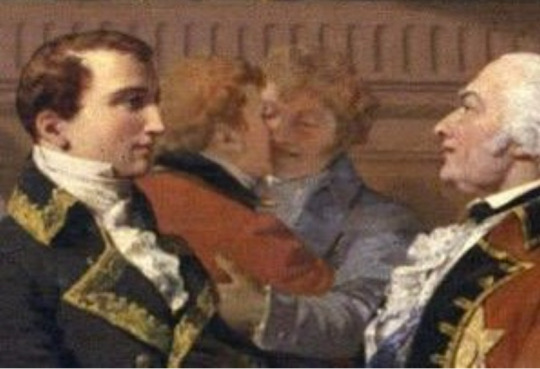
I like that there are two dudes having a moment in the background during the signing of the treaty of Amiens.
(Also, it’s not clear if the dude in the front left is Joseph or Napoleon)
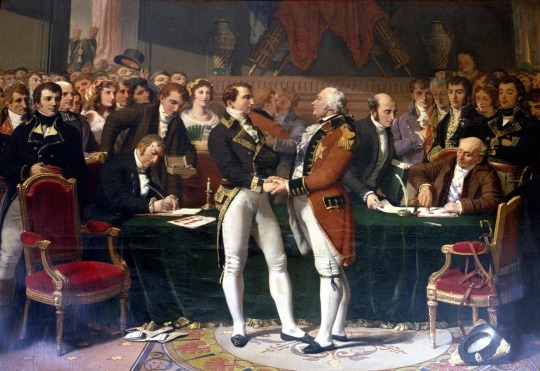
Painting: The Peace of Amiens by Jules-Claude Ziegler
#Jules-Claude Ziegler#Ziegler#napoleon#napoleonic era#napoleonic#napoleon bonaparte#first french empire#joseph bonaparte#Joseph#Napoleon’s brothers#19th century#french empire#the peace of Amiens#Amiens#treaty of Amiens#peace of Amiens#history#french revolution#coalition wars#napoleonic wars#Cornwallis#queer#queer history#gay history
108 notes
·
View notes
Text

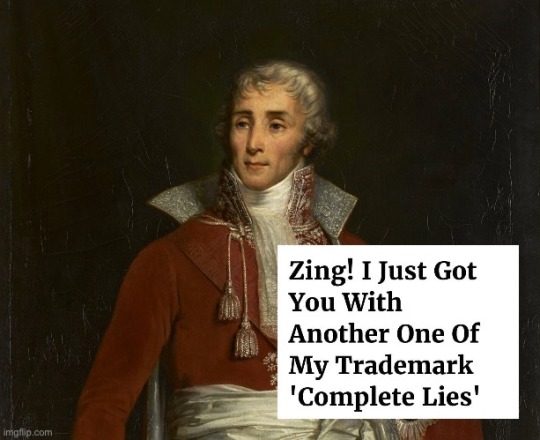


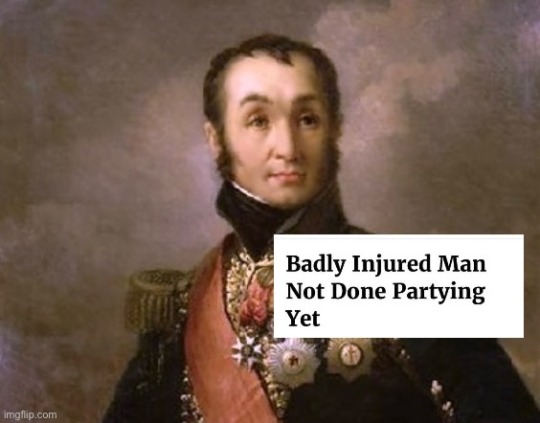
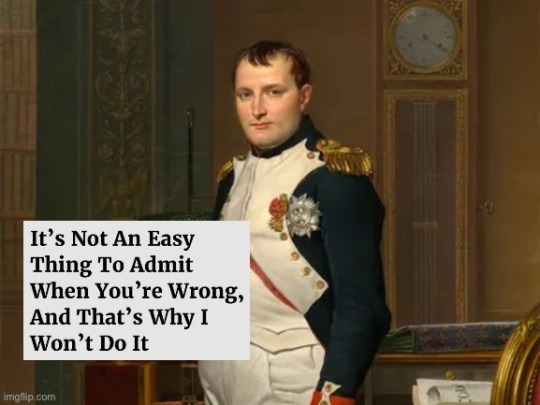


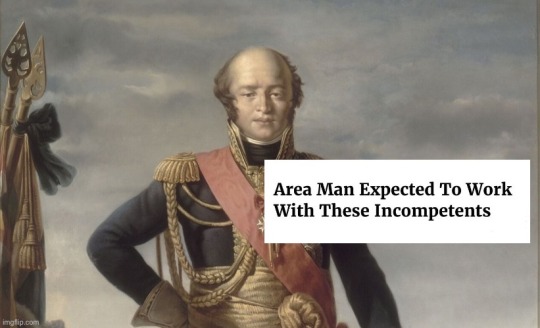

#Napoleonic#Onion Headlines#Napoleonic memes#history memes#Napoleon’s marshals#Napoleon#Napoleon Bonaparte#Napoleonic shitposting#Joachim Murat#Jean Lannes#Joseph Fouché#Louis-Alexandre Berthier#Joseph Bonaparte#Louis-Nicolas Davout
325 notes
·
View notes
Text
oh my god I can't believe I forgot to post this here, better late than never
#joseph bonaparte#i still hate joseph btw#jean de dieu soult#napoleonic era#napoleonic#napoleons marshals#napoleonic shitposting#napoleonic shitpost
17 notes
·
View notes
Photo

Joseph Hopkinson by Thomas Sully
Joseph Hopkinson, a close friend of Napoleon’s brother Joseph, was born in Philadelphia on November 12, 1770. Hopkinson was a lawyer, musician, writer, politician and judge. He and his wife, Emily, hosted a lively salon and mentored artists and writers. One of the things Hopkinson was renowned for during his lifetime was writing “Hail Columbia.” This was the de facto national anthem of the United States for most of the 19th century. It remained a contender until 1931, when “The Star-Spangled Banner” officially gained the title. “Hail Columbia” is now the official Vice Presidential anthem. For details, see “Joseph Hopkinson, Joseph Bonaparte’s Great Friend.”
12 notes
·
View notes